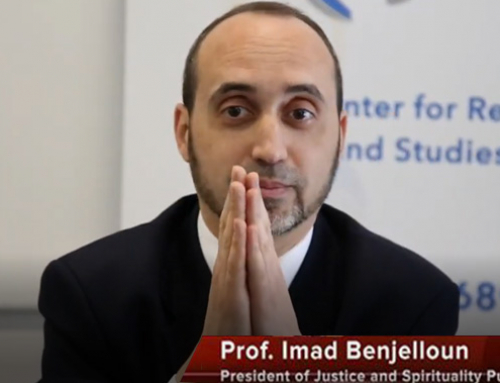Imad Benjelloun
March 19, 2013
1. Set High Standards But Not Too High
Commit yourself to achieving, sustaining, and advancing excellence, and set high standards but not too high to the point where your pursuit of excellence turns into a paralyzing perfectionism. Perfection is pursued not with the intent that it can be attained but so that excellence is continually advanced. Don’t worry if your work is not perfect because it can not be.
In order not to become paralyzed, be realistic and reasonable. Remember that you are not infallible and that no one is except God, so it is ok to try and “fail.” Once you have sincerely tried, some degree of success has already been achieved even if there is “failure.” And don’t worry because you can still get a perfect reward even though you cannot do a perfect work.
The passion and need to perform an excellent work can either lead to a healthy journey which will create a better world and will result in a high degree in the hereafter, if it is rightly guided. Or it can lead to a detrimental paralysis resulting in stress, procrastination, “all-or-nothing paralysis,” “handicapped performance,” societal problems, fear of failure and risk taking, “punishable attitude,” or “crippled imagination,” if it is wrongly managed.
Roedell (1984) states: “In a positive form, perfectionism can provide the driving energy which leads to great achievement. The meticulous attention to detail necessary for scientific investigation, the commitment which pushes composers to keep working until the music realises the glorious sounds playing in the imagination, and the persistence which keeps great artists at their easels until their creation matches their conception all result from perfectionism. Setting high standards is not in itself a bad thing. However, perfectionism coupled with a punishing attitude towards one’s own efforts can cripple the imagination, kill the spirit, and so handicap performance that an individual may never fulfill the promise of early talent.” (p. 128).
2. Remember You Are Not Infallible
A smart decision maker opts for a less perfect outcome rather than no outcome at all. Some degree however so low of perfection can always be improved, but absolutely none cannot since there is nothing there to improve to begin with.
Not taking risks out of fear of failure is the worst of risks because it leads to performance paralysis. No one can ever be perfect anyway. No matter how great your work is, there is always room for improvement. That is because we are human. Only God’s work is perfect and it can only be perfect.
Not being able to excel from the start should not be an excuse for not doing it at all. It is actually the very reason why you should start and try, then learn, improve, and excel. It is a learning curve that one cannot skip; can a baby skip crawling to start walking?
According to Adderholt-Elliot (1989), “paralysed perfectionists are so afraid of being wrong that instead of taking chances, they resort to complete inertia. They may also have problems with decision making, searching for the one perfect solution to a situation rather than choosing from a variety [of] “less perfect” possibilities.” (p. 20).
We should acknowledge that we are not infallible. As long as we exert out utmost efforts to learn and excel, and we are in a process of continual improvement and growth, then it is not abnormal or shameful, for instance, to make mistakes in talking or writing, take missteps in our work, have defects in our products, or have shortcomings in our services.
What matters is that you rise every time you fall.
3. Define your Chief Measure of Success
Can success still be achieved even if one is unable to reach excellence? The process of pursuing excellence is as important as its outcome, both are parts of success. Once you have done your best and have faith in God, you have already started to be successful even if excellence has not been achieved yet.
Instant success is achieved the moment you intend to do good and do it well for the sake of pleasing God. It is instantaneous! Ibn ‘Abbās, may God be pleased with him narrates that Prophet Muhammad, may God bless him and grant him peace, said, “Verily God has prescribed good deeds and bad deeds, and He has made both clear. So, he who intends to do a good deed and does not do it, God will write it down for him as a complete good deed. If he intends to do it and does it, God will write it down for him as ten to seven hundred times, and many more. If he intends to do wrong and does not, God will write it down for him as a complete good deed. And if he intends to do it and does it, God will write it down for him as one bad deed.” (1)
Putting the good intent into a righteous action leads the way to building more success. The level of this built up success in this life for the next will depend on how often focused prayers are invoked, sincere efforts are made, constructive lessons from failures are learned, expertise is gained, results are produced, gratitude to God for and celebration of any achievement is humbly shown, and repentance to God for any shortcomings is genuinely sought.
Sincerity proven by righteous action will make God pleased with you. That is full and ultimate success and that is your chief measure of success.
4. Be Realistic and Reasonable
The standards by which excellence is measured should be high but attainable; perfection is not reachable. As opposed to mediocrity, these high standards usually take time, efforts, and more than one step or misstep to reach and so require gradual progress. So, do not stress yourself, get frustrated, discouraged, or paralyzed if you cannot get it right and well the first time whether by you or by those working with you or for you.
Be realistic. Moderate your expectations and behaviors whenever necessary to free yourself from a paralyzing perfectionism. Do not always expect instantaneous or full success; some works require time and failures before they start flourishing and becoming outstanding. Once you learn from your failures, they are not failures any more but means for success.
Be reasonable. Do not impose your own high standards on others; they might not have the willpower or potential to reach them. Instead, kindly and patiently help and guide them to gradually boost their potential so that they can reach higher.
It is by God and then through missteps and gradual progress that you were able to walk straight when you were still a baby!
5. Learn from Failure to Become a Better Achiever
Some missteps are meant to get you off what would have been the mistaken or not the best way, and so lead you to the right or better way.
Adderholdt-Elliott and Goldberg (1999) state: “If you could look back at your life and remember every minute, you’d find many failures you’ve since forgotten. And some of them would surprise you. What happened the first time you tried to walk? You went down. The first time you tried to ride a bike? You ran into a tree or skidded off a curve. The first time you tried to hit a baseball with a bat? It whizzed by your nose and you swung at the air. The first time you tried to swim? You splashed and sloshed like a sorry fish.”
Success and excellence are relative. You don’t necessarily have to be successful 100% of the times in order to be considered excellent. For example, “baseball is the only field of endeavor where a man can succeed three times out of ten and be considered a good performer” (Gillette & Palmer, 2006, p. 123). Always, remember that success is achieved and your journey for excellence begins the instant you truly put forth your best effort.
Each “first time” can be instrumental in initiating the learning process and hence the path to success. At the end of the day, a “failure” out of trying is not a failure since the lessons learned lead to success. However, a failure out of not making the necessary effort or even trying despite the potential to do so, is a true failure, because it leads to nowhere.
Learn how to turn any “failure,” be it a fault, flaw, misstep, mistake, defect, deficiency, problem, setback, or obstacle into an opportunity for improvement. Use it as a guide to revise your plans and refine your actions along the journey, hence building more, better, and bigger successes.
6. Expect a Perfect Reward
Only excellence can be achieved. Perfection is an act that is attributed exclusively to God, the Magnificent. To think that an excellent work can be 100% perfect amounts to pretending that one could share with God one of His exclusive attributes, or claiming infallibility.
Short-of-perfection excellence is a great reminder of the Oneness and Uniqueness of God.
A true faithful strongly believes that whatever he or she does, no matter how excellent it is, will always be short of perfection. He or she constantly thanks God for enabling him or her to achieve the excellent part and works on improving the non-excellent part.
However, the fact that no one’s work can be perfect except God’s does not mean that one cannot get full reward from Him. You can earn a perfect reward even though your excellent work cannot be perfect, if your intention is sincere, your action is righteous, your effort is well exerted, your plea for forgiveness for any shortcomings is genuine, and your gratitude for any achievement is heartfelt.
So if you do your best and have full confidence in God, He will give you the best, better than you can ever expect or imagine!
God is most Generous and Just.
Conclusion and Continuation
In conclusion, this paper highlighted the importance of excelling in this life for the next, as one of three complementary meanings of iḥsān, the third and highest level of dīn, as defined by Imām Abdessalam Yassine. It made the ten attributes of the Prophetic Method applicable to embarking on a lifetime journey of excellence pursuit with a primary focus on the individual.
There is much further research that can be carried out for such essential meaning of iḥsān, and so a major continuation to this paper would be needed to focus primarily on the organization [jamā’a] in its pursuit of excellence in this life forthe next.
References
| ↑1 | Saḥīḥ al-Bukhārī and Saḥīḥ Muslim [إن الله تعالى كتب الحسنات والسيئات، ثم بين ذلك: فمن هم بحسنة فلم يعملها كتبها الله تعالى عنده حسنة كاملة، فإن هم بها فعملها كتبها الله عنده عشر حسنات، إلى سبعمائة ضعف، إلى أضعاف كثيرة؛ وإن هم بسيئة فلم يعملها كتبها الله عنده حسنة كاملة، فإن هم بها فعملها كتبها الله تعالى سيئة واحدة، ولا يهلك على الله إلا هالك] |
|---|




